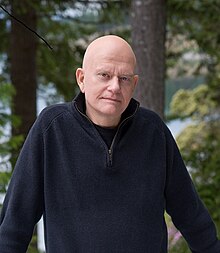William C. Dietz
Appearance

William C. Dietz (born 1945) is an American science fiction writer, principally of military science fiction novels and video game novelizations.
Quotes
[edit]The Final Battle (1995)
[edit]- New York: Ace Books, paperback.
- General Natalie Norwood stood, stretched, and eyed into the empty expanse of the light-blue computer screen built into the top of her desk. The cursor blinked steadily inthe lower right-hand corner. It had taken twelve hours of hard work to deal with the seemingly-endless stream of orders, requests, reports, inquiries, memos, interragatories, and just plain bullshit that went along with command of Confederacy Battle Station Alpha XIV, better known to her six-thousand-plus inhabitants as the Old Lady (plus a host of other less charitable names). And old she was, dating back to before the Human-Hudathan war, having originally been commissioned as a battleship.
- p. 1-2
Earthrise (2002)
[edit]- New York: Ace Books, paperback.
- The sun had risen, the early-morning air was crisp, and Manning could see his breath. From his vantage point, standing atop the vast stack of cargo modules known as "Big Pink," he could also see a generous swath of the strange, almost surreal landscape in which he and thousands of slaves had been been forced to live during the last few months. Months that felt like years.
What he and everyone else referred to as "Hell Hill" was located on a finger of land once known as Governors' Point, locate djust south of the once thriving city of Bellingham, Washington. A place that had once been home to a well-respected state college, a small but charming central business district, and a population willing to trade the hectic pace of a city like Seattle for the pleasures of kayaking on Puget Sound, snowboarding on Mount Baker, and hiking in the cascades. But that was prior to February 28, 2020, the day that the Saurons destroyed the cities of New York, Paris, Moscow, Madrid, Cairo, Beijing, Sydney, Lima, Rio de Janeiro, Johannesburg, Tehran, and New Dehli.- p. 1-2
- The worst damage was inflicted by powerful energy cannons mounted on Sauron spaceships. Dreadnoughts that measured almost a mile in length, were more than two thousand feet wide, and carried upward of twenty thousand aliens plus the slaves required to support them.
Though unable to descend through the atmosphere, the largest battleships had no difficulty firing their weapons from space itself. Earth's atmosphere shrieked in protest each time a bolt of energy tore through the air. Those located within a half mile of the impact experienced a chest-thumping concussion, and if they were fortunate enough to survive, could watch skyscrapers toppple, bridges collapse, and entire neighborhoods erupt into flame. The fires spread to suburbs, grasslands, forests, and jungles. Soon the entire planet was wrapped in a blanket of thick gray smoke.- p. 2
- No, the Saurons were careful to stop short of complete annihilation, not because they had a system of ethics, but because they needed the survivors. Needed slaves to construct the enormous citadel-like fortresses within which a new generation of Saurons would hatch, each killing its progenitor during the birth process, and each taking its place within the complex racial hierarchy upon which the alien culture had been built. A social structure in which each caste had a distinct function: The Zin governed, the Kan fought, and the Fon performed menial work, or would have performed menial work had it not been for the diminutive Ra 'Na, a slave race upon which the aliens were heavily dependent.
A relationship which over hundreds of years had become so entrenched that something approaching a symbiotic relationship had evolved. A reality that helped explain why many of the whip-wielding Fon overseers carried Ra 'Na technicians on their chitin-covered backs even as they forced thousands of humans to ascend Hell Hill.- p. 3

